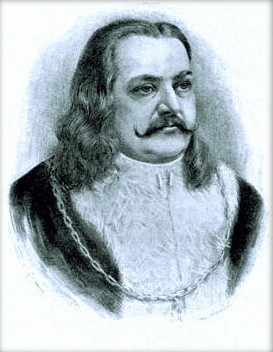22.4. 1467 George of Poděbrady against the Green Mountain Unity
Categories: Personalities , Years of war and revolution , Calendar
 After several attempts at reconciliation, Jiří of Poděbrady declared war on Zielona Góra Unity on 22 April 1467. The siege of towns, castles and fortresses ended in victory for the Czech monarch. However, it was far from a definitive peace in the future.
After several attempts at reconciliation, Jiří of Poděbrady declared war on Zielona Góra Unity on 22 April 1467. The siege of towns, castles and fortresses ended in victory for the Czech monarch. However, it was far from a definitive peace in the future.
After the sudden death of Ladislaus the Terrible in 1457, Jiří of Poděbrady ascended the throne. He was elected by the Diet and was the first free choice of a monarch by the Bohemian Estates, regardless of earlier arrangements or dynastic treaties. Jiří of Poděbrad was a good diplomat, he managed to gradually win the recognition of all the estates of the Czech Crown. He also managed to establish good relations with the surrounding rulers and with the Roman monarch. He also made a great move towards Hungary when he married his daughter to the local king Matthias Corvinus.
The economy flourished under George of Poděbrady. He restored silver mining in Kutná Hora, the minting of Prague groschen and strengthened security on the trade routes. In 1462, he sent a message to Pope Pius II asking him to recognise the so-called compact. A key law that formed the basis of George of Poděbrady's political conception. The Pope, however, did not comply. Not only did he refuse the request and declare the compact publicly abrogated, but four years later he put the Czech monarch under a curse and declared him deposed from the throne.
This made things difficult for George of Poděbrady in Bohemia, and opposition began to form against him from among the Catholic nobility. This was the so-called Zelenohorská Unity. It was in 1467 that their uprising was successfully suppressed by the king. "In April of that year, George declared war on the rebellious lords and within a few months he conquered a number of their settlements. The Green Mountain Unity, on the other hand, brought the large Moravian towns, the West Bohemian town of Pilsen and some Catholic courtiers, who until then had remained loyal to the king, to their side. Jiří also fought in the neighbouring lands, where he was generally the master of the situation," Jaroslav Pánek and Oldřich Tůma write in their book History of the Czech Lands.
The Pope declared a crusade against the heretical Bohemians, and Matthias Korvín, then the former wall of George of Poděbrady, took the lead in March 1468. During the following months, George lost a considerable part of Moravia and several fortresses in neighbouring lands. A change of forces did not occur until the beginning of 1469 at Vilémov, where Matthias was saved from a crushing defeat only by a truce.
"George released his adversary on his word of honour, and in addition promised to support his candidacy for the imperial throne in return for brokering an agreement with the papal see. Matthias, however, did not keep his engagements, and when the leaders of the Green Mountain Unity offered him the Bohemian crown, he gave inMay 1469 in Olomouc to be elected Czech ruler," write Jaroslav Pánek and Oldřich Tůma.
Renewed fighting continued with alternating success until the death of George of Poděbrady on 22 March 1471.Before he died, he managed to conclude a succession agreement with the Polish king Casimir IV. Someone from the Jagiellonian family was to become the new King of Bohemia.
Petr Kovář: Topics-general overview, Jaroslav Pánek, Oldřich Tůma: History of the Czech Lands, www.wikipedia.org
The article is included in categories: